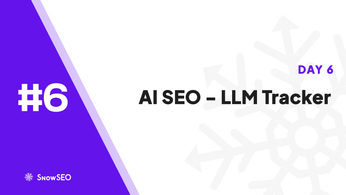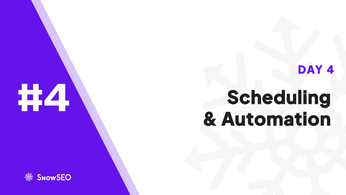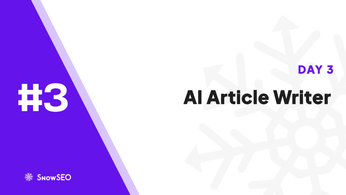
11 AI Insights to Beat Your Competition
Table of Contents
In a rapidly evolving digital landscape, AI isn’t just an advantage—it’s a necessity for staying competitive. Many businesses struggle to leverage AI effectively due to a lack of strategic insights and actionable plans. Discover 11 powerful AI insights that can transform your business strategy and boost your competitive edge. Backed by industry experts and real-world examples, these insights provide you with a roadmap to AI success, as highlighted by Stanford’s AI Index and OECD research.
Why AI is Essential for Modern Business
Understanding AI’s Role
Artificial Intelligence (AI) has become a cornerstone in modern business, driving efficiency, innovation, and competitive advantage. A 2023 study by the U.S. Census Bureau revealed that only 3.8% of businesses reported using AI to produce goods and services, with the Information sector leading at 13.8% adoption. (census.gov) This indicates a significant opportunity for businesses to leverage AI for growth.
In the federal sector, AI adoption has seen a substantial increase. The 2024 Federal AI Use Case Inventory reported over 1,700 AI applications across various agencies, more than doubling from the previous year. These applications range from enhancing operational efficiency to improving public service delivery. (cio.gov)
AI vs Traditional Methods
Traditional business methods often rely on manual processes and human decision-making, which can be time-consuming and prone to errors. In contrast, AI systems can analyze vast amounts of data rapidly, identify patterns, and make informed decisions with minimal human intervention. For instance, the Department of Veterans Affairs has implemented AI to automate medical imaging processes, enhancing diagnostic services for veterans. (cio.gov)
Moreover, AI’s ability to process and interpret complex data sets surpasses traditional analytical methods. This capability enables businesses to gain deeper insights into market trends, customer behavior, and operational performance, leading to more strategic decision-making and a competitive edge in the marketplace.

In summary, integrating AI into business operations is no longer a luxury but a necessity. It offers unparalleled advantages over traditional methods, positioning companies to thrive in an increasingly data-driven and competitive environment.
11 Key AI Insights to Elevate Your Business Strategy
Artificial Intelligence (AI) is revolutionizing the business landscape, offering unprecedented opportunities for growth and innovation. By integrating AI into various facets of operations, companies can enhance efficiency, personalize customer experiences, and make data-driven decisions. Below are 11 key AI insights that can elevate your business strategy.
1. AI in Personalized Marketing
AI enables businesses to deliver highly personalized marketing experiences by analyzing vast amounts of customer data to predict preferences and behaviors. This approach enhances customer engagement and increases conversion rates. For instance, AI algorithms can segment audiences more precisely, allowing for tailored content that resonates with individual consumers.
Benefits:
- Enhanced Customer Engagement: Personalized recommendations foster a deeper connection with customers.
- Increased Conversion Rates: Targeted marketing strategies lead to higher sales.
- Efficient Resource Allocation: AI optimizes marketing spend by focusing on high-potential leads.
Implementation Steps:
- Data Collection: Gather comprehensive customer data from various touchpoints.
- AI Integration: Utilize AI tools to analyze data and identify patterns.
- Content Personalization: Develop marketing materials tailored to individual preferences.
- Performance Monitoring: Continuously assess and refine strategies based on AI insights.
2. AI-Driven Decision Making
Incorporating AI into decision-making processes allows businesses to analyze complex datasets swiftly, leading to more informed and timely decisions. AI models can identify trends, forecast outcomes, and provide actionable insights that human analysis might overlook.
Advantages:
- Data-Driven Insights: AI processes large datasets to uncover hidden patterns.
- Predictive Analytics: Forecast future trends and customer behaviors.
- Risk Mitigation: Identify potential risks and develop proactive strategies.
Implementation Steps:
- Data Infrastructure: Establish robust systems for data collection and storage.
- AI Model Development: Create models tailored to specific business needs.
- Integration: Embed AI insights into decision-making workflows.
- Continuous Learning: Update models regularly to adapt to new data.
3. Optimizing Supply Chains with AI
AI enhances supply chain management by improving demand forecasting, inventory management, and logistics. By analyzing historical data and real-time inputs, AI can predict demand fluctuations, optimize stock levels, and streamline delivery routes.
Benefits:
- Cost Reduction: Minimize overstock and stockouts, reducing holding costs.
- Efficiency: Optimize logistics for faster and more reliable deliveries.
- Adaptability: Quickly respond to market changes and disruptions.
Implementation Steps:
- Data Integration: Consolidate data from suppliers, warehouses, and sales channels.
- AI Analytics: Apply AI to analyze data and predict demand.
- Process Automation: Automate inventory replenishment and logistics planning.
- Performance Review: Regularly assess supply chain performance and adjust strategies.
4. Enhancing Customer Service with AI Chatbots
AI-powered chatbots provide 24/7 customer support, handling inquiries, resolving issues, and guiding users through processes. They improve response times and customer satisfaction while reducing operational costs.
Advantages:
- Availability: Offer round-the-clock support without human intervention.
- Scalability: Handle multiple inquiries simultaneously.
- Consistency: Provide uniform responses, ensuring quality control.
Implementation Steps:
- Needs Assessment: Identify common customer queries and issues.
- Chatbot Development: Design bots with natural language processing capabilities.
- Integration: Embed chatbots into websites, apps, and social media platforms.
- Monitoring and Improvement: Analyze interactions to refine chatbot performance.
5. AI in Product Development
AI accelerates product development by analyzing market trends, customer feedback, and competitor offerings. It aids in identifying gaps in the market and predicting product success.
Benefits:
- Innovation: Discover new product opportunities through data analysis.
- Speed: Reduce time-to-market with efficient development processes.
- Customer Alignment: Ensure products meet evolving customer needs.
Implementation Steps:
- Market Analysis: Use AI to study market data and identify trends.
- Idea Generation: Develop concepts based on AI insights.
- Prototyping: Utilize AI in design and testing phases.
- Launch and Feedback: Monitor product performance and iterate as needed.
6. AI for Financial Forecasting
AI enhances financial forecasting by analyzing historical data and identifying patterns that inform budgeting, investment decisions, and risk management.
Advantages:
- Accuracy: Improve financial predictions with data-driven insights.
- Risk Assessment: Identify potential financial risks proactively.
- Strategic Planning: Inform long-term financial strategies.
Implementation Steps:
- Data Collection: Aggregate financial data from various sources.
- Model Development: Create AI models tailored to financial forecasting.
- Integration: Incorporate AI insights into financial planning processes.
- Review and Adjust: Regularly update models to reflect current data.
7. AI in Talent Acquisition
AI streamlines recruitment by analyzing resumes, assessing candidate fit, and predicting employee success. It reduces hiring time and improves the quality of hires.
Benefits:
- Efficiency: Automate screening processes to handle large applicant pools.
- Bias Reduction: Implement objective criteria to minimize unconscious bias.
- Predictive Hiring: Forecast candidate success based on data analysis.
Implementation Steps:
- Job Analysis: Define key competencies and qualifications.
- AI Tools Selection: Choose platforms that align with recruitment needs.
- Process Automation: Automate resume screening and initial assessments.
- Continuous Improvement: Evaluate hiring outcomes to refine AI processes.
8. AI for Customer Insights
AI analyzes customer data to uncover insights into preferences, behaviors, and satisfaction levels, informing marketing and product strategies.
Advantages:
- Deep Understanding: Gain comprehensive insights into customer needs.
- Segmentation: Identify distinct customer groups for targeted strategies.
- Feedback Analysis: Assess customer sentiment from reviews and surveys.
Implementation Steps:
- Data Aggregation: Collect data from sales, support, and social media channels.
- AI Analysis: Use AI to process and interpret data.
- Strategy Development: Formulate plans based on AI-derived insights.
- Monitoring: Track the effectiveness of strategies and adjust accordingly.
9. AI in Cybersecurity
AI enhances cybersecurity by detecting anomalies, predicting potential threats, and automating responses to security incidents.
Benefits:
- Threat Detection: Identify and respond to threats in real-time.
- Efficiency: Automate routine security tasks.
- Adaptability: Continuously learn from new threats to improve defenses.
Implementation Steps:
- Risk Assessment: Evaluate current security posture.
- AI Integration: Deploy AI tools for threat detection and response.
- Training: Educate staff on AI-driven security protocols.
- Continuous Monitoring: Regularly update AI systems to address emerging threats.
10. AI for Process Automation
AI automates repetitive tasks, freeing up human resources for more strategic activities and increasing overall operational efficiency.
Advantages:
- Cost Savings: Reduce labor costs associated with manual tasks.
- Consistency: Ensure uniformity in task execution.
- **Scalability
Ready to outpace your competition? SnowSEO streamlines AI-driven SEO, automates content, and uncovers growth opportunities so you can implement the 11 AI insights instantly. Explore our toolkit at https://snowseo.com to start integrating AI today.
Frequently Asked Questions
Q1: How can AI give my business a competitive edge?
AI empowers businesses to automate repetitive tasks, analyze vast datasets for actionable insights, and personalize customer experiences at scale. By adopting AI-driven tools, companies can optimize operations, reduce costs, and identify new opportunities faster than competitors. Leveraging AI also enables faster decision-making and more accurate forecasting, helping businesses adapt to market changes with agility.
Q2: What are the biggest challenges when implementing AI?
The most common challenges include data quality issues, lack of skilled personnel, and integration with existing systems. Many organizations struggle with aligning AI initiatives to business goals or managing change across teams. A clear strategy, robust data governance, and ongoing training are essential for overcoming these obstacles and maximizing AI’s impact.
Q3: Is AI only for large enterprises, or can small businesses benefit too?
AI is accessible to businesses of all sizes. Cloud-based AI services and user-friendly platforms make it possible for small businesses to automate processes, enhance marketing, and improve customer service without heavy upfront investment. Even modest AI adoption can yield significant efficiency gains and competitive advantages.
Conclusion
Artificial Intelligence (AI) is revolutionizing business landscapes, offering companies a significant competitive edge. According to the U.S. Census Bureau’s 2023 Annual Business Survey, AI adoption has led to increased efficiency without reducing workforce numbers. (census.gov) Furthermore, research from the Brookings Institution indicates that firms investing in AI experience growth in sales and employment, particularly through product innovation. (brookings.edu) To maintain this advantage, it’s crucial to stay informed and continuously leverage AI advancements.





